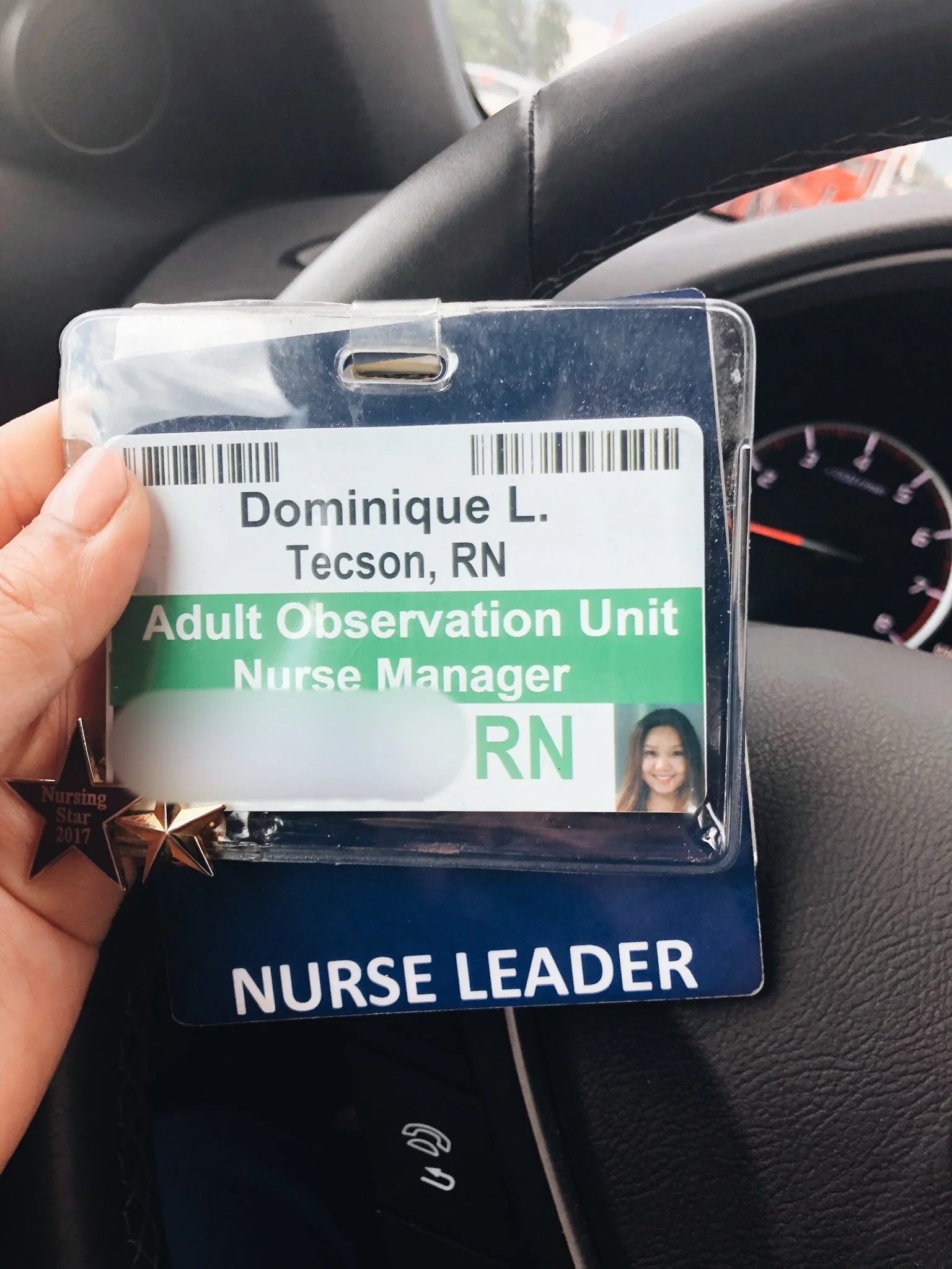Take Charge of Your Career and Become a Nurse Leader by Age 30
I started my career as a nurse manager at the age of 27. As mentioned from old posts, I was highly involved in my organization, in which allowed me to grow in my nursing leadership practice. As I go through interviews and check-ins with my team, I realize that not a lot want to go into leadership altogether. Despite of some having the absolute potential for it, not a lot of people are looking their way into management. In this post, I hope to inspire you why nurses, young or not, should look forward to leadership someday.
Nurse Leaders are essential members of the healthcare team. They serve as the bridge between clinical staff and leadership, providing direction and support for their departments while also ensuring patient safety and quality of care. As a Nurse Leader, you will be responsible for managing personnel, budgets, resources and more. Additionally, you will have opportunities to shape policies that affect the entire hospital or clinic where you work. Becoming a nurse leader at an early age provides many benefits; such as gaining experience in leading teams quickly, developing a strong professional network faster than your peers who wait until later in their career to advance into nursing leadership roles, access to higher levels of decision-making authority earlier than others in your profession may have access too and being able to take advantage of professional development opportunities ahead of other nurses of similar ages.
Developing Your Leadership Skills
Developing communication skills is essential for any Nurse Leader. This includes the ability to communicate effectively with members of the medical team, patients and their families, as well as other healthcare professionals. It involves listening attentively and responding in a timely manner to ensure that everyone feels heard and respected. Additionally, it requires speaking clearly so that all parties understand what is being conveyed.
Understanding different leadership styles helps nurse leaders find an approach that works best for them and their team based on individual personalities and organizational needs. Flexibility in how you lead can be beneficial when dealing with different situations, such as providing feedback or tackling tough conversations productively. Leaders should also strive to set clear expectations from the start by establishing roles within their teams while remaining open-minded about others’ ideas or solutions.
Finally, building resilience and resourcefulness are important traits for successful nurse leaders who must handle stressful situations competently without becoming overwhelmed or discouraged easily. Resourcefulness means having the courage to seek out new information sources when needed while maintaining focus on key objectives at hand despite setbacks or obstacles encountered along the way. Resilience allows nurses to persevere through difficult times while staying focused on their goals rather than dwelling on past mistakes or failures
Who to Network With
In order to effectively network as a Nurse Leader, it is important to identify other influential individuals in the field. This includes connecting with peers within your own organization and community, as well as those outside of your immediate area. By engaging with these professionals through social media platforms or professional organizations, you can expand your knowledge base and gain valuable insight into best practices for success in nursing leadership roles.
Finding mentors is also an invaluable way to build relationships and learn from experienced nurse leaders who have succeeded in their respective positions. Mentors provide support, advice, and guidance that can be applied directly to current challenges faced by emerging nurse leaders. Additionally, they offer encouragement while helping young nurses navigate tricky situations or develop strategies for long-term career growth.
Attending conferences and workshops led by established healthcare professionals provides an opportunity to meet potential employers or colleagues while expanding one’s horizons by learning about new trends in the field of nursing leadership. These events often feature presentations from successful practitioners who are willing to share their experiences and answer questions related to career advancement or management skills development; providing aspiring Nurse Leaders with invaluable resources that will help them progress in their profession quickly.
Developing Your Clinical Expertise
Developing a clinical expertise is essential for any nurse leader. This involves mastering the clinical skills required to provide safe and effective patient care, such as proper medication administration or wound care techniques. It also includes understanding organizational cultures and systems in order to best serve patients and their families. Professional development opportunities are important for nurses of all levels in order to stay up-to-date on current best practices and learn from more experienced colleagues. These can include attending conferences, lectures, seminars, webinars or certification courses that focus on leadership topics like evidence-based practice or team building strategies. Additionally, reading industry journals or books about healthcare management can help nurses gain knowledge in these areas while providing them with valuable insight into how different organizations operate within the larger health system. Finally, taking time to observe other healthcare professionals at work provides an opportunity to learn from their practices while gaining real world experience that will be beneficial when transitioning into nursing leadership roles.
Balancing Your Professional and Personal Life
Finding balance between professional and personal life is essential in order to reach your full potential as a Nurse Leader. Establishing boundaries such as limiting work hours, setting aside time for yourself and preserving relationships with family and friends are important steps towards achieving this goal. Taking regular breaks throughout the day can also help reduce stress levels while providing opportunities to refresh or relax. Additionally, it is important for nurse leaders to learn how to delegate tasks efficiently so that they don’t become overwhelmed by their responsibilities.
Managing stress effectively is another key component of creating balance in one’s life as a nurse leader. This includes learning relaxation techniques such as deep breathing or meditation which can be done quickly during work breaks or even on the go when feeling particularly tense. It is also beneficial to find activities that bring joy into your life outside of work; whether it be spending time with loved ones, pursuing hobbies or engaging in physical activity like yoga or running. Finally, maintaining good self-care practices by eating healthy meals, getting enough sleep and exercising regularly will ensure you have the energy necessary for long days at work without sacrificing your overall wellbeing in the process.
Making the Right Choices
Making educated decisions is an important part of any nurse leader’s job. This includes staying up to date on best practices and current trends in the field, understanding how their choices will impact other departments in the hospital or clinic, and being aware of changes to regulations or policies that could affect patient care. Utilizing resources such as evidence-based practice guidelines, research studies, and professional development courses can help nurse leaders make informed decisions while providing them with a deeper understanding of their role. Getting experience in nursing leadership roles is also essential for success; whether it be through internships or shadowing more experienced practitioners. By observing different styles of management within various organizations, nurses can develop skills that they may not have had access too otherwise, which can be beneficial when transitioning into a new position later on down the line.
Conclusion
Becoming a nurse leader before age 30 can be a rewarding and fulfilling experience. By taking on leadership roles early in your career, you have the opportunity to build relationships with colleagues and patients, gain valuable experience managing teams of healthcare professionals, and expand your knowledge base through continued professional development. Additionally, it is important for young nurse leaders to understand how to effectively network within their field by connecting with peers or finding mentors who can provide guidance while helping them grow as individuals. Lastly, striving for balance between work and personal life allows nurses to perform at their best without sacrificing their overall wellbeing in the process. With dedication and perseverance, any aspiring nurse leader under the age of 30 has what it takes to make a positive impact on patient care while furthering their career goals quickly.
To succeed as an early-career Nurse Leader requires hard work but is achievable with some key tips and tricks. Firstly, having strong communication skills helps ensure that everyone feels heard during conversations while allowing information to be conveyed clearly among all parties involved; this includes being able to listen attentively as well as speaking concisely when necessary. Secondly, understanding different leadership styles will help you find an approach that works best for both yourself and your team depending on individual personalities or organizational needs; staying flexible whilst setting clear expectations from the start are also essential traits for success in nursing management roles. Thirdly networking strategically is important so that connections can be made with influential figures outside of one’s immediate area who can offer valuable insight into best practices related to nursing leadership positions – such as attending conferences or workshops led by experienced practitioners whenever possible . Finally building resourcefulness alongside resilience enables nurses leaders maintain focus despite any setbacks encountered along the way whilst providing them courage seek out new sources of information when needed too; these traits are critical qualities required for successful outcomes regardless of challenges faced by emerging Nurse Leaders today





